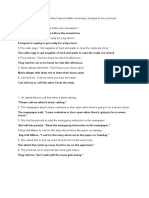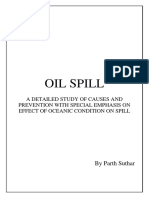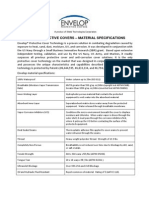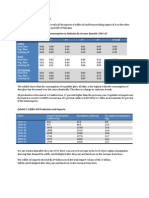Oil Spills
Oil Spills
Uploaded by
api-243184664Copyright:
Available Formats
Oil Spills
Oil Spills
Uploaded by
api-243184664Original Title
Copyright
Available Formats
Share this document
Did you find this document useful?
Is this content inappropriate?
Copyright:
Available Formats
Oil Spills
Oil Spills
Uploaded by
api-243184664Copyright:
Available Formats
By: Genesis Velis
per.4
12/17/13
Essential questions
How do humans affect the condition of the
environment?
What can be done to improve global environmental
conditions?
An oil spill is the release of a liquid petroleum hydrocarbon into the
environment, especially marine areas, due to human activity, and is a form of
pollution. The term is usually applied to marine oil spills, where oil is released
into the ocean or coastal waters, but spills may also occur on land. Oil spills
may be due to releases of crude oil from tankers, offshore platforms, drilling
rigs and wells, as well as spills of refined petroleum products (such as gasoline,
diesel) and their by-products, heavier fuels used by large ships such as bunker
fuel, or the spill of any oily refuse or waste oil.
One of the factors that cause oil spills are tanker accidents.
Only a small percentage of global oil spills are related to tanker
accidents due to explosions, hull failure, or running aground, however.
These spills tend to be very harmful because of the sheer volume of
oil released at once, and they pose a serious threat to marine animals
and seabirds. Such disasters frequently bring attention to issues with
safe oil handling, which can lead to reforms in petroleum regulation.
Oil spills in the water can also be caused by natural seepage. As
tectonic plates shift, oil can be released from reserves trapped deep
beneath the ocean floor. Natural seepage is sometimes accelerated
through human activity such as drilling.
Oil spills often result in both immediate and long-term environmental damage. Some of the
environmental damage caused by an oil spill can last for decades after the spill occurs. Some of
the most notable environmental damages typically caused by oil spills are; oil spills damage
beaches, Marshlands and fragile marine ecosystems.
When an oil slick from a large oil spill reaches the beach, the oil coats and clings to every
rock and grain of sand. If the oil washes into coastal marshes, mangrove forests or other
wetlands, fibrous plants and grasses absorb the oil, which can damage the plants and make the
whole area unsuitable as wildlife habitat.
When some of the oil eventually stops floating on the surface of the water and begins to sink
into the marine environment, it can have the same kind of damaging effects on fragile underwater
ecosystems, killing or contaminating many fish and smaller organisms that are essential links in the
global food chain.
The U.S. Coast Guard has set up a base in St. Petersburg, Florida to track and coordinate
cleanup efforts for any spilled oil that touches the states west coast. This base is the first installed in
the state to address the Gulf spill; the Florida panhandle response is being handled by a command post
in Mobile, Alabama. As the base commander said in a St. Petersburg Times article yesterday, Were
reviewing strategies, were tracking spill trajectories. Were planning how were going to respond to the
impact on the west coast of Florida. In the same article, U.S. Coast Guard Captain Tim Close said they
expect to have around 72 hours warning before the oil would hit the area, probably in a dispersed
fashion and in the form of tar balls and blobs.
In Mississippi, the Department of Marine Resources (DMR) which is currently offering
volunteer training and the Department of Environmental Quality are continuing to prepare for the oil to
make landfall. Coastal states such as Mississippi and Louisiana are distributing protective booms around
marshes and estuaries in an attempt to limit the amount of toxins entering shellfish and fish habitats.
These ar some things being done to prevent oil spills.
Heres what we can do to help:
1.There are MANY volunteers opportunities ongoing in Louisiana, Mississippi,Florida and Alabama.
BP has just announced its training location for volunteer oil spill cleanup at the Mobile Civic
Center in Alabama. You do require some specialized training. Call 1-866-647-2338 to register for
classes.
2. Report oiled, injured or deceased wildlife. To report injured or oiled wildlife, call 1-866-557-
1401 and leave a message.
Remember there are still way more things you can do to help! Take action to help prevent Oil
Spills! :)
"Oil Spill." Wikipedia. Wikimedia Foundation, 30 Jan. 2014. Web. 02 Feb. 2014.
"What Causes Oil Spills?" WiseGEEK. N.p., n.d. Web. 02 Feb. 2014.
"How Do Oil Spills Damage the Environment?" About.com Environmental Issues. N.p., n.d. Web.
30 Jan. 2014.
"EcoTone: News and Views on Ecological Science." EcoTone News and Views on Ecological
Science. N.p., n.d. Web. 02 Feb. 2014.
You might also like
- William Shakespeare's Star Wars: Educator's Guide100% (4)William Shakespeare's Star Wars: Educator's Guide19 pages
- Oil Spill Prevention For Middle School Students100% (1)Oil Spill Prevention For Middle School Students75 pages
- Oil Spills and There Effects On Sea LifeNo ratings yetOil Spills and There Effects On Sea Life15 pages
- Environmental Effects Of: The Pacific OceanNo ratings yetEnvironmental Effects Of: The Pacific Ocean35 pages
- Oil Spill in The Gulf of Mexico: Group - J100% (1)Oil Spill in The Gulf of Mexico: Group - J23 pages
- Oil Spills: Presented By: Nayyab Nadeem Hamayal Wajid Lodhi Shaima Saqib Sara Hassan Sajal ShahbazNo ratings yetOil Spills: Presented By: Nayyab Nadeem Hamayal Wajid Lodhi Shaima Saqib Sara Hassan Sajal Shahbaz67 pages
- Catastrophes in Oil and Petrochemical Industries100% (2)Catastrophes in Oil and Petrochemical Industries21 pages
- Gajender Lal: Presentation On Oil SpillNo ratings yetGajender Lal: Presentation On Oil Spill21 pages
- Exxon Valdez Oil Spill: Mustafa Şimşek-Korcan Kır 27.11.2014100% (1)Exxon Valdez Oil Spill: Mustafa Şimşek-Korcan Kır 27.11.201420 pages
- Oil Spill and Marine Ecosystem: - Satish More (01)100% (1)Oil Spill and Marine Ecosystem: - Satish More (01)12 pages
- Food - and - Beverage - Processing - jOHNSON sCREENSNo ratings yetFood - and - Beverage - Processing - jOHNSON sCREENS12 pages
- Minerals and Metal Review July 2012 - 3No ratings yetMinerals and Metal Review July 2012 - 320 pages
- 4 - Triveni Product Brochure Turbine Solutions FinalNo ratings yet4 - Triveni Product Brochure Turbine Solutions Final20 pages
- The Gem & Jewellery Export Promotion CouncilNo ratings yetThe Gem & Jewellery Export Promotion Council32 pages
- Envelop Protective Covers Material SpecificationsNo ratings yetEnvelop Protective Covers Material Specifications2 pages
- Counterparty List Isc Pertamina - 07 April 2020No ratings yetCounterparty List Isc Pertamina - 07 April 20204 pages
- Inchmaree Clause Definition - InvestopediaNo ratings yetInchmaree Clause Definition - Investopedia2 pages
- Composite Applications Using Coir Fibres in Sri Lanka100% (1)Composite Applications Using Coir Fibres in Sri Lanka37 pages
- TUGAS ARTIKEL BHS.INGGRIS MUH.RAFLY RAMADHANNo ratings yetTUGAS ARTIKEL BHS.INGGRIS MUH.RAFLY RAMADHAN11 pages
- Design The Future Urban Plan of The Underground Construction From The Aspect of Geological and Geotechnical Features of Belgrade's Inner City AreaNo ratings yetDesign The Future Urban Plan of The Underground Construction From The Aspect of Geological and Geotechnical Features of Belgrade's Inner City Area8 pages
- Karen Thompson Walker What Fear Can Teach UsNo ratings yetKaren Thompson Walker What Fear Can Teach Us7 pages
- Macro Context of Science and TechnologyNo ratings yetMacro Context of Science and Technology10 pages
- Randolf Froylan Quispe Mamani Titanic Book Activities: A) 269 Meters (882 Feet)No ratings yetRandolf Froylan Quispe Mamani Titanic Book Activities: A) 269 Meters (882 Feet)7 pages
- The Great Fire of London Reading Reading Comprehension Exercises 79354No ratings yetThe Great Fire of London Reading Reading Comprehension Exercises 793543 pages
- Course Outline - Emergency Response Plan and PreparednessNo ratings yetCourse Outline - Emergency Response Plan and Preparedness4 pages
- Flood Vulnerability Assessment Using Geospatial Techniques: Chennai, IndiaNo ratings yetFlood Vulnerability Assessment Using Geospatial Techniques: Chennai, India13 pages
- Urban Flood Management Introduction 1st International Expert Meeting On Urban Flood Management 1st Edition Andras Szollosi-Nagy (Author)No ratings yetUrban Flood Management Introduction 1st International Expert Meeting On Urban Flood Management 1st Edition Andras Szollosi-Nagy (Author)70 pages
- Activity 2 Group Activities Risk ManagementNo ratings yetActivity 2 Group Activities Risk Management7 pages
- Crisis Intervention and Crisis Management - Strategies That Work in Schools and CommunitiesNo ratings yetCrisis Intervention and Crisis Management - Strategies That Work in Schools and Communities321 pages
- Lesson - 14 When The Earth Shook SupplementaryNo ratings yetLesson - 14 When The Earth Shook Supplementary7 pages
- Oil Spills: Presented By: Nayyab Nadeem Hamayal Wajid Lodhi Shaima Saqib Sara Hassan Sajal ShahbazOil Spills: Presented By: Nayyab Nadeem Hamayal Wajid Lodhi Shaima Saqib Sara Hassan Sajal Shahbaz
- Exxon Valdez Oil Spill: Mustafa Şimşek-Korcan Kır 27.11.2014Exxon Valdez Oil Spill: Mustafa Şimşek-Korcan Kır 27.11.2014
- Oil Spill and Marine Ecosystem: - Satish More (01)Oil Spill and Marine Ecosystem: - Satish More (01)
- Food - and - Beverage - Processing - jOHNSON sCREENSFood - and - Beverage - Processing - jOHNSON sCREENS
- 4 - Triveni Product Brochure Turbine Solutions Final4 - Triveni Product Brochure Turbine Solutions Final
- Composite Applications Using Coir Fibres in Sri LankaComposite Applications Using Coir Fibres in Sri Lanka
- Design The Future Urban Plan of The Underground Construction From The Aspect of Geological and Geotechnical Features of Belgrade's Inner City AreaDesign The Future Urban Plan of The Underground Construction From The Aspect of Geological and Geotechnical Features of Belgrade's Inner City Area
- Randolf Froylan Quispe Mamani Titanic Book Activities: A) 269 Meters (882 Feet)Randolf Froylan Quispe Mamani Titanic Book Activities: A) 269 Meters (882 Feet)
- The Great Fire of London Reading Reading Comprehension Exercises 79354The Great Fire of London Reading Reading Comprehension Exercises 79354
- Course Outline - Emergency Response Plan and PreparednessCourse Outline - Emergency Response Plan and Preparedness
- Flood Vulnerability Assessment Using Geospatial Techniques: Chennai, IndiaFlood Vulnerability Assessment Using Geospatial Techniques: Chennai, India
- Urban Flood Management Introduction 1st International Expert Meeting On Urban Flood Management 1st Edition Andras Szollosi-Nagy (Author)Urban Flood Management Introduction 1st International Expert Meeting On Urban Flood Management 1st Edition Andras Szollosi-Nagy (Author)
- Crisis Intervention and Crisis Management - Strategies That Work in Schools and CommunitiesCrisis Intervention and Crisis Management - Strategies That Work in Schools and Communities

























































































